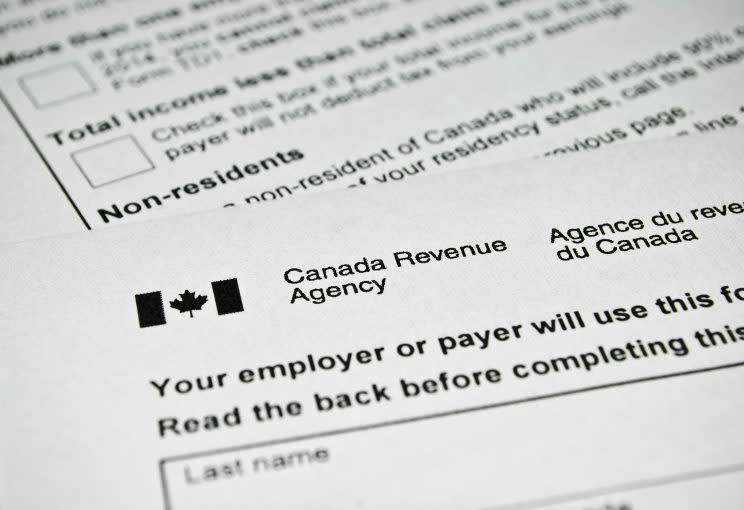Why tax protesters are getting it all wrong

Last summer, Russell Porisky was sentenced to five-and-a-half years in jail and fined nearly $260,000 for tax evasion and counselling others on how to do the same.
The B.C.-based anti-tax crusader is the founder of the Paradigm Education Group, which sold a variety of material and offered seminars on the subject of avoiding income taxes.
Despite Porisky’s sentencing and fines imposed on his other disciples, tax protests remain a prominent an issue in Canada.
According to Lindsay Tedds, associate professor at the University of Victoria who focuses on tax policy, the theory propagated by the Paradigm Education Group is currently the rationale that is in vogue among tax protesters, but is part of a continuing evolution of ways Canadians who simply don’t want to pay taxes, validate their stance.
“All of these cases, it almost feels like these individuals — these people that are so out there — they’ll try to glom onto anything to try to get out of doing something that they just don’t want to do,” she told Yahoo Finance Canada.
Myth: Natural persons don’t have to pay taxes
In the case of the followers of the Paradigm Education Group, or other so-called “sovereign citizens” or “Freeman-on-the-Land,” Tedds said they argue that only legal persons, not natural persons have to pay taxes.
A legal person is a non-human entity created by people, or natural persons, to form a group that is subject to the law, such as corporations.
Porisky and others of his ilk argue that natural persons are not actually required to pay taxes or follow laws in general.
However, Tedds said this is “absolutely” baseless and it is “so far-fetched” she can’t “even imagine where they got it from.”
“I’m not entirely sure what logic that argument is based on because a legal person definition is just a composite of natural people and it doesn’t suggest that natural people are above the law,” she said.
“(They’re) suggesting only legal people have to follow the law — as opposed to natural people, which are just individuals and of course have to follow the law.”
The CRA and judges agree with her assessment.
And it isn’t an insignificant among of funding that is being lost to Canadians who subscribe to these theories.
A 2014 report found that Canadian coffers had suffered “staggering losses” from those who subscribed to the Paradigm Education Group’s beliefs that “natural persons” are not subject to taxes.”
However, Tedds said it difficult to know just how much is being lost.
The CRA is currently in the process of trying to estimate the country’s tax gap and released data on how much was lost to non-compliance with GST and HST last year.
Myth: Federal income and direct taxes are illegal
Before the natural persons’ argument gained steam, another popular argument was that federal income and direct taxes are illegal.
While Tedds hasn’t seen any cases of it in the last 10 years, protesters used to cite the decision in Attorney General of Nova Scotia v. Attorney General of Canada and Lord Nelson Hotel Company Ltd.
In that case, the Supreme Court ruled that one level of government can’t pass on its powers to another.
Tax protesters argued this ruling indicated that income and other direct taxes were illegal because direct taxes were delegated to the provinces in the Constitution Act.
However, as Tedds pointed out, the Constitution Act also allows the federal government to raise money by any “mode or system of taxation,” meaning both direct and indirect taxes.
Myth: If you don’t own land, you don’t have to pay tax
But perhaps the most outlandish and one of the original arguments used by protesters, was that if you didn’t own land, you didn’t have to pay taxes.
So, protesters would attempt to argue they live in a boat on the water, or didn’t have a fixed address.
“The way law is written, we’re more interested in the intent of the law than necessarily the exact words that are used,” said Tedds.
“Sometimes these guys use … an exact word and interpret it in a way to allow them to use these arguments, but what is more important is the law’s intent.”
Despite overwhelming evidence against the claims of tax protesters, it is hard to reason with them, said Tedds.
“That’s the tricky part to this: these are people who desperately want to not believe what’s true, and that’s something that’s very difficult to rally against,” she said.
“When people believe something [and] they hold something to be true, no amount of evidence to the contrary necessarily sways them from that belief.”
Tedds admitted that it’s difficult to “get into the heads of people” who may susceptible to the appeal of tax protests, but the main thing to understand is that if you earn income, you owe the government part of it.
Ultimately, the issue is important because Tedds said tax evasion can shake the foundation of the system. If people don’t fulfill their obligation it can sway those who do to abandon theirs as they see avoiders continuing to benefit and they’re forced to take on more of the burden, she said.
“There are individuals who will go forward and say, ‘They’re just wasting my tax money,’ but at the same time they using the health care system, they’re driving on the streets, they’re drinking potable water,” said Tedds.
“A lot of tax money goes to goods that we can’t exclude people from, so when they don’t share that burden and they’re still achieving the benefits, we’re really bumping up against the issue of fairness.“

 Yahoo Finance
Yahoo Finance 
